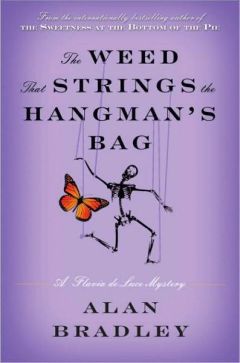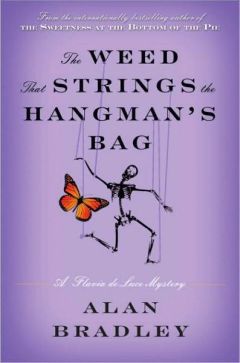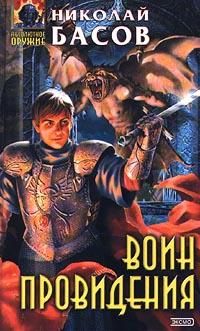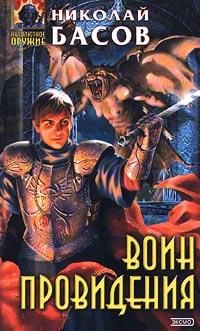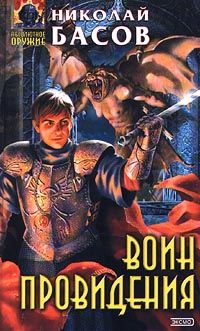Alan Bradley - A Red Herring Without Mustard: A Flavia de Luce Novel
The wagon teetered a bit on its springs as I stepped onto the shafts and clambered up towards the driving seat. The ornamental door handle was cold in my hand as I gave it a twist. The door swung open—it had not been locked.
“Hello?”
I stepped inside and reached for the paraffin lamp that glowed dully above the stove. As I turned up the wick, the glass shade sprang to light with a horrid sticky red brilliance.
Blood! There was blood everywhere. The stove and the curtains were splattered with the stuff. There was blood on the lampshade—blood on my hands.
Something dripped from the ceiling onto my face. I shrank back in revulsion—and perhaps a little fright.
And then I saw the Gypsy—she was lying crumpled at my feet: a black tumbled heap lying perfectly still in a pool of her own blood. I had almost stepped on her.
I knelt at her side and took her wrist between my thumb and forefinger. Could that thin stirring possibly be a pulse?
If it was, I needed help, and needed it quickly. Mucking about would do no good.
I was about to step out onto the driving seat when something stopped me in my tracks. I sniffed the air, which was sharp with the coppery, metallic smell of blood.
Blood, yes—but something more than blood. Something out of place. I sniffed again. What could it be?
Fish! The caravan reeked of blood and fish!
Had the Gypsy woman caught and cooked a fish in my absence? I thought not; there was no sign of a fire or utensils. Besides, I thought, she had been too weak and tired to do so. And there had certainly been no fishy smell about the caravan when I left it earlier.
I stepped outside, closed the door behind me, and leapt to the ground.
Running back to Buckshaw for help was out of the question. It would take far too long. By the time the proper people had been awakened and Dr. Darby summoned, the Gypsy might well be dead—if she wasn’t already.
“Gry!” I called, and the old horse came shuffling towards me. Without further thought, I leapt onto his back, flung my arms round his neck, and gave his ribs a gentle kick with my heels. Moments later we were trotting across the bridge, then turning north into the leafy narrowness of the Gully.
In spite of the darkness, Gry kept up a steady pace, as if he were familiar with this rutted lane. As we went along, I learned quickly to balance on his bony spine, ducking down as overhanging branches snatched at my clothing, and wishing I’d been foresighted enough to bring a sweater. I’d forgotten how cold the nights could be at the end of summer.
On we trotted, the Gypsy’s horse outdoing himself. Perhaps he sensed a hearty meal at the end of his journey.
Soon we would be passing the tumbledown residence of the Bulls, and I knew that we would not pass unnoticed. Even in broad daylight there were seldom travelers in the narrow lane. In the middle of the night, the unaccustomed sound of Gry’s hooves on the road would surely be heard by one of the half-wild Bull family.
Yes, there it was: just ahead of us on the right. I could smell it. Even in the dark I could see the gray curtain of smoke that hung about the place. Spotted here and there about the property, the embers of the smoldering rubbish tips glowed like red eyes in the night. In spite of the lateness of the hour, the windows of the house were blazing with light.
No good begging for help here, I thought. Mrs. Bull had made no bones about her hatred of the Gypsy.
Seizing a handful of Gry’s thick mane, I tugged at it gently. As if he had been trained from birth to this primitive means of control, the old horse slowed to a shamble. At the change of pace, one of his hooves struck a rock in the rutted road.
“Shhh!” I whispered into his ear. “Tiptoe!”
I knew that we had to keep moving. The Gypsy woman needed help desperately, and the Bulls’ was not the place to seek it.
A door banged as someone came out into the yard—on the far side of the house, by the sound of it.
Gry stopped instantly and refused to move. I wanted to whisper into his ear to keep going, that he was a good horse—a remarkable horse—yet I hardly dared breathe. But Gry stood as motionless in the lane as if he were a purebred pointer. Could it be that a Gypsy’s horse knew more about stealth than I did? Had years of traveling the unfriendly roads taught him more low cunning than even I possessed?
I made a note to think more about this when we were no longer in peril.
By the sound of it, the person in the yard was now rummaging through a lot of old pots, muttering to themselves whenever they stopped the clatter. The light from the house, I knew, would cast me into deeper darkness. Better, though, to make myself smaller and less visible than a rider on horseback.
I waited until the next round of banging began, and slipped silently to the ground. Using Gry as a shield, I kept well behind him so that my white face would not be spotted in the darkness.
When you’re in a predicament time slows to a crawl. I could not begin to guess how long we stood rooted to the spot in the lane; it was probably no more than a few minutes. But almost immediately I found myself shifting my weight uneasily from foot to foot and shivering in the gloom while Gry, the old dear, had apparently fallen asleep. He didn’t move a muscle.
And then the racket stopped abruptly.
Had the person in the garden sensed our presence? Were they lying in wait—ready to spring—on the far side of the house?
More time leaked past. I couldn’t move. My heart was pounding crazily in my chest. It seemed impossible that whoever was in the Bulls’ garden could fail to hear it.
They must be keeping still … listening, as I was.
Suddenly there came to my nostrils the sharp reek of a safety match; the unmistakeably acrid odor of phosphorus reacting with potassium chlorate. This was quickly followed by the smell of a burning cigarette.
I smiled. Mrs. Bull was taking a break from her brats.
But not for long. A door banged and a dark shape fluttered across behind one of the closed curtains.
Before I could talk myself out of it I began moving along the lane—slowly at first, and then more quickly. Gry walked quietly behind me. When we reached the trees at the far edge of the property, I scrambled up onto his back and urged him on.
“Dr. Darby’s surgery,” I said. “And make it snappy!”
As if he understood.
The surgery was situated in the high street, just round the corner from Cow Lane. I lifted the knocker—a brass serpent on a staff—and pounded at the door. Almost instantly, or so it seemed, an upstairs window flew open with a sharp wooden groan and Dr. Darby’s head appeared, his gray, wispy hair tousled from sleeping.
“The bell,” he said grumpily. “Please use the bell.”
I gave the button a token jab with my thumb, and somewhere in the depths of the house a muted buzzing went off.
“It’s the Gypsy woman,” I called up to him. “The one from the fête. I think someone’s tried to kill her.”
The window slammed shut.
It couldn’t have been more than a minute before the front door opened and Dr. Darby stepped outside, shrugging himself into his jacket. “My car’s in the back,” he said. “Come along.”
“But what about Gry?” I asked, pointing at the old horse, which stood quietly in the street.
“Bring him round to the stable,” he said. “Aesculapius will be glad of his company.”
Aesculapius was the ancient horse that had pulled Dr. Darby’s buggy until about ten years ago, when the doctor had finally caved in to pressure from patients and purchased a tired old bull-nosed Morris—an open two-seater that Daffy referred to as “The Wreck of the Hesperus.”
I hugged Gry’s neck as he sidled into the stall with an almost audible sigh.
“Quickly,” Dr. Darby said, tossing his bag into the back of the car.
A few moments later we were veering off the high street and into the Gully.
“The Palings, you said?”
I nodded, hanging on for dear life. Once, I fancied I caught Dr. Darby stealing a glance at my bloody hands in the dim light of the instrument panel, but whatever he might have been thinking, he kept it to himself.
We rocketed along the narrow lane, the Morris’s headlamps illuminating the green tunnel of the trees and hedgerows with bounces of brightness. We sped past the Bulls’ place so quickly that I almost missed it, although my mind did manage to register the fact that the house was now in total darkness.
As we shot across the little stone bridge and into the grove, the Morris nearly became airborne, then bounced heavily on its springs as Dr. Darby brought it to a skidding halt just inches from the Gypsy’s caravan. Even in the dark his knowledge of Bishop’s Lacey’s lanes and byways was remarkable, I thought.
“Stay here,” he barked. “If I need you, I’ll call.” He threw open the driver’s door, walked briskly round the caravan, and was gone.
Alone in the darkness, I gave an involuntary shiver.
To be perfectly honest, my stomach was a bit queasy. I don’t mind death, but injury makes me nervous. It would all depend upon what Dr. Darby found inside the caravan.
I shifted restlessly in the Morris, trying to sift through these rather unexpected feelings. Was the Gypsy woman dead? The thought that she might be was appalling.
Although Death and I were not exactly old friends, we did have a nodding acquaintance. Twice before in my life I had encountered corpses, and each one had given me—
“Flavia!” The doctor was at the caravan’s door. “Fetch a screwdriver. It’s in the tool kit in the boot.”
A screwdriver? What kind of—
It was perhaps just as well that my speculations were interrupted.
“Quickly. Bring it here.”
At any other time I might have balked at his insolence in ordering me about like a lackey, but I bit my tongue. In fact, I even forgave him a little.
As Dr. Darby began loosening the screws of the door hinges, I couldn’t help thinking what remarkably strong hands he had for an older man. If he hadn’t used them to save lives, he might have made a wizard carpenter.
“Unscrew the last few,” he said. “I’ll take the weight of the door. That’s it … good girl.”
Even without knowing what we were doing, I was his willing slave.
As we worked, I caught glimpses of the Gypsy beyond, in the caravan’s interior. Dr. Darby had lifted her from the floor to her bed where she lay motionless, her head wrapped in surgical gauze. I could not tell if she was dead or alive and it seemed awkward to ask.
At last the door came free of the frame, and for an instant, Dr. Darby held it in front of him like a shield. The image of a crusader crossed my mind.
“Easy now—put it down here.”
He maneuvered the heavy panel carefully onto the caravan’s floor, where it fit with not an inch to spare between the stove and the upholstered seats. Then, plucking two pillows from the bed, he placed them lengthwise on the door, before wrapping the Gypsy in a sheet and ever so gently lifting her from the bunk onto the makeshift stretcher.
Again I was struck with his compact strength. The woman must have weighed almost as much as he did.
“Quickly now,” he said. “We must get her to the hospital.”
So! The Gypsy was alive. Death had been thwarted—at least for now.
Pulling a second sheet from the bed, Dr. Darby tore it into long strips, which he worked swiftly into position under the door, then round and round the Gypsy, fastening the ends with a series of expert knots.
He had positioned her so that her feet were closest to the empty door frame, and now I watched as he eased past her and leapt to the ground outside.
I heard the Morris’s starter grind—and then engage. The motor roared and moments later I saw him backing his machine towards the caravan.
Now he was clambering back aboard.
“Take this end,” he said, pointing to the Gypsy’s feet. “It’s lighter.”
He scrambled past me, seized the end of the door that lay beneath her head, and began sliding it towards the doorway.
“Into the offside seat,” he said. “That’s it … easy now.”
I had suddenly seen what he was trying to do, and as Dr. Darby lifted the head of the door, I guided its foot down into the space between the passenger’s seat and the instrument panel.
With surprisingly little struggle, our task was finished. With the Gypsy jutting up at a rigid angle, the little Morris looked like an oversized woodworking plane; the Gypsy herself like a mummy lashed to a board.
It isn’t the neatest of arrangements, I remember thinking, but it will do.
“You’ll have to stay here,” Dr. Darby said, wedging himself in behind the steering wheel. “There’s not room for the three of us in the old bus. Just stay put and don’t touch anything. I’ll send the police as soon as I’m able.”
What he meant, of course, was that I was in far less physical danger if I remained in one spot, rather than risking the possibility of flushing out the Gypsy’s attacker by walking home alone to Buckshaw.
I gave the doctor a halfhearted thumbs-up. More than that would have been out of place.
He let in the clutch and the car, with its weird cargo, began teetering slowly across the grove. As it crept over the humpbacked bridge, I had my last glimpse of the Gypsy, her face dead white in the light of a sudden moon.
FIVE
NOW I WAS TRULY alone.
Or was I?
Not a leaf stirred. Something went plop in the water nearby, and I held my breath. An otter, perhaps? Or something worse?
Could the Gypsy’s attacker still be here in the Palings? Still hiding … still watching … from somewhere in the trees?
It was a stupid thought, and I realized it instantly. I’d learned quite early in life that the mind loves nothing better than to spook itself with outlandish stories, as if the various coils of the brain were no more than a troop of roly-poly Girl Guides huddled over a campfire in the darkness of the skull.
Still, I gave a little shiver as the moon slipped behind a cloud. It had been cool enough when I’d first come here with the Gypsy, chilly when I’d ridden Gry into the village for Dr. Darby, and now, I realized, I was beastly cold.
The lights of the caravan glowed invitingly, warm patches of orange in the blue darkness. If a wisp of smoke had been floating up from the tin chimney, the scene might have been one of those frameable tear-away prints in the weekly magazines: A Gypsy Moon, for instance.
It was Dr. Darby who had left the lamp burning. Should I scramble aboard and turn it out?
Vague thoughts of saving paraffin crossed my mind, and even vaguer thoughts of being a good citizen.
Saints on skates! I was looking for an excuse to get inside the caravan and have a jolly good gander at the scene of the crime. Why not admit it?
“Don’t touch anything,” Dr. Darby had said. Well, I wouldn’t. I’d keep my hands in my pockets.
